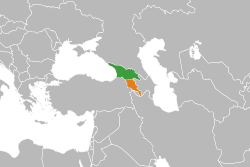Armenian-Georgian relations

|
|
|
|
|
| Georgia | Armenia |
The relations between the Republic of Armenia and Georgia are friendly but complicated. Both states have signed numerous cooperation agreements.
Good relations with Georgia are important for Armenia, as it is boycotted by its two neighbors Turkey and Azerbaijan due to the Nagorno-Karabakh conflict . Before the collapse of the Soviet Union , 85% of goods and energy imports were transacted through Azerbaijani territory. As a result of the Nagorno-Karabakh conflict and the subsequent closure of the border by Azerbaijan, this transport corridor was no longer available. Deliveries from Russia now have to pass through Georgia , which means that Armenia's imports are dependent on poor Georgian-Russian relations and, with Verkhny Lars, the only border crossing that is not on separatist territory. The railway line from Russia to Armenia runs through Abkhazia and is closed, it is considered unlikely that it will reopen in the foreseeable future.
Different orientations of their foreign policy prevent deeper cooperation between the two states. Georgia pursues a pro-Western and anti-Russian foreign policy, while Armenia is allied with Russia and at the same time seeks good relations with the West. Armenia bothers that Georgia maintains a close relationship with Azerbaijan and Turkey , while Georgia sees Armenia as a satellite state of Russia . Armenia is a member of the Russia-led Collective Security Treaty Organization and has limited relations with the West and NATO under ISAF and the Iraq war . Georgia, on the other hand, has not been a member of the Collective Security Treaty Organization since 1999, is a founding member of GUAM and would like to join NATO.
Although Armenia leans against Russia in terms of foreign policy, it has not recognized the independence of Abkhazia and South Ossetia .
Web links
Individual evidence
- ↑ Houman A. Sadri and Omar Vera-Muñiz: Iranian relations with the South Caucasus . In: Thomas Juneau and Sam Razavi (eds.): Iranian Foreign Policy since 2001 . Routledge, Abingdon 2013, ISBN 978-0-415-82743-0 , pp. 145 .
- ↑ Claude Moniquet and William Racimora: The Armenia-Iran Relationship - Strategic implication for security in the South Caucasus region . European Strategic Intelligence & Security Center, Brussels 2013, p. 13 ( esisc.org [PDF]).
- ^ A b Frederik Coene: The Caucasus: an introduction . 1st edition. Routledge, London 2010, ISBN 978-0-203-87071-6 , pp. 171 .
- ↑ Claude Moniquet and William Racimora: The Armenia-Iran Relationship - Strategic implication for security in the South Caucasus region . European Strategic Intelligence & Security Center, Brussels 2013, p. 27 ( esisc.org [PDF]).
- ↑ Claude Moniquet and William Racimora: The Armenia-Iran Relationship - Strategic implication for security in the South Caucasus region . European Strategic Intelligence & Security Center, Brussels 2013, p. 28 ( esisc.org [PDF]).
